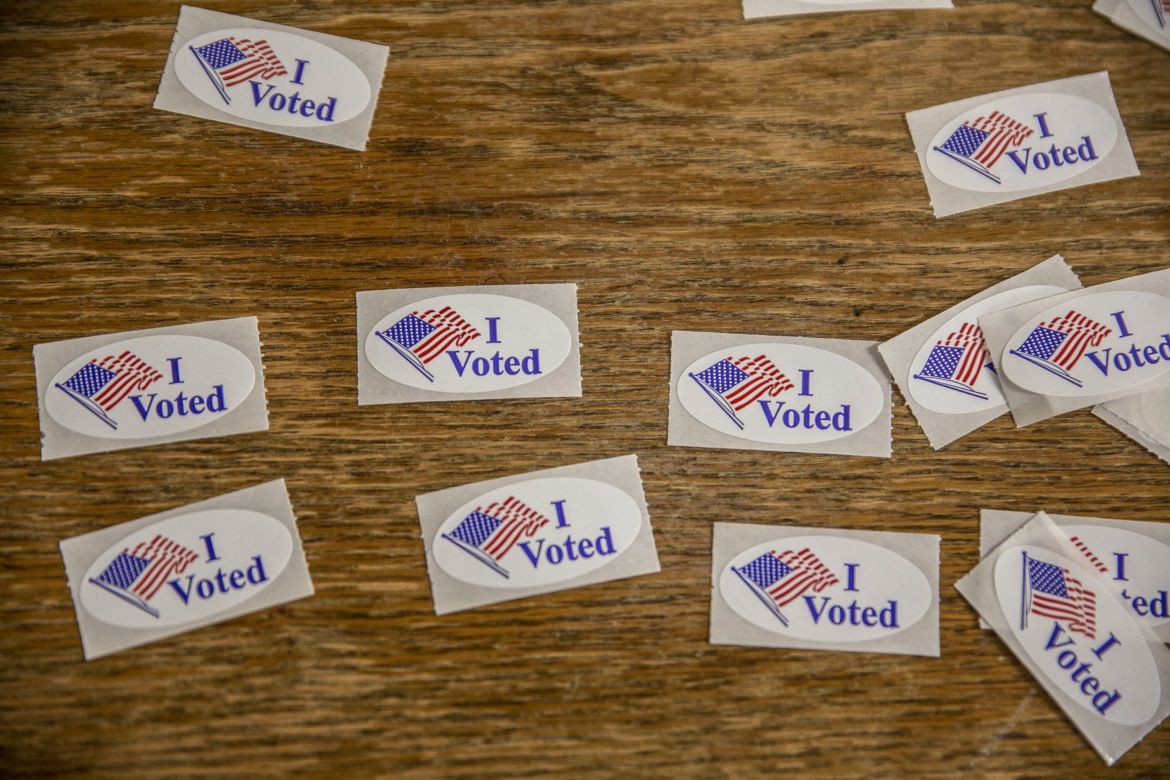Mississippi Today
Legislature restores no voting rights during 2023 session

Legislature restores no voting rights during 2023 session
The Mississippi Legislature, for the first time since 2016, did not restore voting rights to any person convicted of a felony.
Mississippi is the only state in the nation that requires people convicted of certain felonies to petition the Legislature to restore their voting rights. Most years the Legislature passes a handful of bills — normally about five — to restore voting rights to individuals convicted of felonies.
Seven bills restoring voting rights died on the Senate calendar when the 2023 session ended on Saturday around 2 a.m. Senate Judiciary B Chair Joey Fillingane, R-Sumrall, said he opted to let the bills die instead of bringing them up for a vote because he did not think he could garner the two-thirds majority needed to pass each bill.
“It seemed like there was not enough support,” Fillingane said. “They barely passed out of committee on close votes. And before the full Senate, it takes a two-thirds vote instead of a majority vote to pass. Instead of embarrassing anyone by calling them up and having them defeated, we decided not to call them up.”
Fillingane said he spoke with the senators who he thought would be on the fence, and they all indicated they would be “no” votes.
Mississippi is among a handful of states — fewer than 10 — that do not restore voting rights at some point after people complete their sentence. And Mississippi is the only state requiring people to navigate the cumbersome legislative maze to have their voting rights restored.
The most suffrage bills passed in one session during the 2000s was in 2004 when 34 were approved, according to a Mississippi Today analysis. In 2009, 2012 and 2016, like this past session, no felony suffrage bill was approved. In 2021, there were five approved and in 2021 two were passed.
A lawsuit is pending before the U.S. Supreme that argues Mississippi's felony suffrage provisions are in violation of the U.S. Constitution. The lawsuit argues that the provision was placed in the state's 1890 constitution as one of many devices to prevent Black Mississippians from voting. The thought at the time was that impoverished African Americans might be more prone to commit certain crimes like theft and embezzlement, so those specific crimes were determined by the writers of the state constitution to be disenfranchising crimes. Meanwhile, the framers deemed people did not lose the right to vote for many more serious crimes such as murder and rape.
In 2022, the 5th Circuit Court of Appeals conceded that the provision was placed in the state constitution as a deterrent to African Americans voting. But the appeals court ruled in a split decision that because the state constitution was amended later to make murder and rape disenfranchising crimes, that the 1890 provision was no longer unconstitutional.
The Mississippi Center for Justice and others are appealing that decision to the U.S. Supreme Court.
Rob McDuff, an attorney with the center, said the fact that the Supreme Court has not yet dismissed the case could be a good sign and suggest the justices “are continuing to look at it.” The case was appealed to the Supreme Court in October 2022.
McDuff said it was disappointing that the Legislature did not restore any voting rights this session, but stressed that there are “thousands of people who have served their sentence and the fact that the Legislature generally restores voting rights to a few each session is another indication that the provision in the 1890 Constitution should be repealed in its entirety.”
Fillingane said the Senate in recent years has normally restored voting rights to only those convicted of crimes that would be considered non-violent, such as embezzlement. He said those convicted this year were convicted of crimes that could be considered more violent, such as robbery. One of the people under consideration had been convicted of using public property illegally. The Senate has routinely refused to take up cases where people were convicted of stealing or embezzling public funds.
But Fillingane said as chair of the Judiciary B Committee he wanted to give those people an opportunity this year but opted not to bring them up before the full Senate because he did not think there were enough votes to pass them.
The original list of crimes deemed to be disenfranchising has been updated by official opinions from the Attorney General's office through the years to coincide with modern criminal law.
The crimes on the list via the opinions are arson, armed robbery, bigamy, bribery, embezzlement, extortion, felony bad check, felony shoplifting, forgery, larceny, murder, obtaining money or goods under false pretense, perjury, rape, receiving stolen property, robbery, theft, timber larceny, unlawful taking of a motor vehicle, statutory rape, carjacking and larceny under lease or rental agreement.
This article first appeared on Mississippi Today and is republished here under a Creative Commons license.
Mississippi Today
2024 Mississippi legislative session not good for private school voucher supporters
Despite a recent Mississippi Supreme Court ruling allowing $10 million in public money to be spent on private schools, 2024 has not been a good year for those supporting school vouchers.
School-choice supporters were hopeful during the 2024 legislative session, with new House Speaker Jason White at times indicating support for vouchers.
But the Legislature, which recently completed its session, did not pass any new voucher bills. In fact, it placed tighter restrictions on some of the limited laws the state has in place allowing public money to be spent on private schools.
Notably, the Legislature passed a bill that provides significantly more oversight of a program that provides a limited number of scholarships or vouchers for special-needs children to attend private schools.
Going forward, thanks to the new law, to receive the vouchers a parent must certify that their child will be attending a private school that offers the special needs educational services that will help the child. And the school must report information on the academic progress of the child receiving the funds.
Also, efforts to expand another state program that provides tax credits for the benefit of private schools was defeated. Legislation that would have expanded the tax credits offered by the Children's Promise Act from $8 million a year to $24 million to benefit private schools was defeated. Private schools are supposed to educate low income students and students with special needs to receive the benefit of the tax credits. The legislation expanding the Children's Promise Act was defeated after it was reported that no state agency knew how many students who fit into the categories of poverty and other specific needs were being educated in the schools receiving funds through the tax credits.
Interestingly, the Legislature did not expand the Children's Promise Act but also did not place more oversight on the private schools receiving the tax credit funds.
The bright spot for those supporting vouchers was the early May state Supreme Court ruling. But, in reality, the Supreme Court ruling was not as good for supporters of vouchers as it might appear on the surface.
The Supreme Court did not say in the ruling whether school vouchers are constitutional. Instead, the state's highest court ruled that the group that brought the lawsuit – Parents for Public Schools – did not have standing to pursue the legal action.
The Supreme Court justices did not give any indication that they were ready to say they were going to ignore the Mississippi Constitution's plain language that prohibits public funds from being provided “to any school that at the time of receiving such appropriation is not conducted as a free school.”
In addition to finding Parents for Public Schools did not have standing to bring the lawsuit, the court said another key reason for its ruling was the fact that the funds the private schools were receiving were federal, not state funds. The public funds at the center of the lawsuit were federal COVID-19 relief dollars.
Right or wrong, The court appeared to make a distinction between federal money and state general funds. And in reality, the circumstances are unique in that seldom does the state receive federal money with so few strings attached that it can be awarded to private schools.
The majority opinion written by Northern District Supreme Justice Robert Chamberlin and joined by six justices states, “These specific federal funds were never earmarked by either the federal government or the state for educational purposes, have not been commingled with state education funds, are not for educational purposes and therefore cannot be said to have harmed PPS (Parents for Public Schools) by taking finite government educational funding away from public schools.”
And Southern District Supreme Court Justice Dawn Beam, who joined the majority opinion, wrote separately “ to reiterate that we are not ruling on state funds but American Rescue Plan Act (ARPA) funds … The ARPA funds were given to the state to be used in four possible ways, three of which were directly related to the COVID -19 health emergency and one of which was to make necessary investments in water, sewer or broadband infrastructure.”
Granted, many public school advocates lamented the decision, pointing out that federal funds are indeed public or taxpayer money and those federal funds could have been used to help struggling public schools.
Two justices – James Kitchens and Leslie King, both of the Central District, agreed with that argument.
But, importantly, a decidedly conservative-leaning Mississippi Supreme Court stopped far short – at least for the time being – of circumventing state constitutional language that plainly states that public funds are not to go to private schools.
And a decidedly conservative Mississippi Legislature chose not to expand voucher programs during the 2024 session.
This article first appeared on Mississippi Today and is republished here under a Creative Commons license.
Mississippi Today
On this day in 1925


MAY 19, 1925

Malcolm X was born Malcolm Little in Omaha, Nebraska. When he was 14, a teacher asked him what he wanted to be when he grew up and he answered that he wanted to be a lawyer. The teacher chided him, urging him to be realistic. “Why don't you plan on carpentry?”
In prison, he became a follower of Nation of Islam leader Elijah Muhammad. In his speeches, Malcolm X warned Black Americans against self-loathing: “Who taught you to hate the texture of your hair? Who taught you to hate the color of your skin? Who taught you to hate the shape of your nose and the shape of your lips? Who taught you to hate yourself from the top of your head to the soles of your feet? Who taught you to hate your own kind?”
Prior to a 1964 pilgrimage to Mecca, he split with Elijah Muhammad. As a result of that trip, Malcolm X began to accept followers of all races. In 1965, he was assassinated. Denzel Washington was nominated for an Oscar for his portrayal of the civil rights leader in Spike Lee's 1992 award-winning film.
This article first appeared on Mississippi Today and is republished here under a Creative Commons license.
Did you miss our previous article…
https://www.biloxinewsevents.com/?p=359877
Mississippi Today
On this day in 1896


MAY 18, 1896

The U.S. Supreme Court ruled 7-1 in Plessy v. Ferguson that racial segregation on railroads or similar public places was constitutional, forging the “separate but equal” doctrine that remained in place until 1954.
In his dissent that would foreshadow the ruling six decades later in Brown v. Board of Education, Justice John Marshall Harlan wrote that “separate but equal” rail cars were aimed at discriminating against Black Americans.
“In the view of the Constitution, in the eye of the law, there is in this country no superior, dominant, ruling class of citizens,” he wrote. “Our Constitution in color-blind and neither knows nor tolerates classes among citizens. In respect of civil rights, all citizens are equal before the law. The humblest is the peer of the most powerful. The law … takes no account of his surroundings or of his color when his civil rights as guaranteed by the supreme law of the land are involved.”
This article first appeared on Mississippi Today and is republished here under a Creative Commons license.
Did you miss our previous article…
https://www.biloxinewsevents.com/?p=359301
-
SuperTalk FM7 days ago
Martin Lawrence making 3 stops in Mississippi on comedy tour
-
Our Mississippi Home5 days ago
Beat the Heat with Mississippi’s Best Waterparks
-
SuperTalk FM3 days ago
State auditor cracking down on Mississippians receiving unemployment benefits
-
Our Mississippi Home6 days ago
Charlie’s U-Pik: Opening Soon for the Summer Season
-
Mississippi News Video5 days ago
Jackson has a gang problem
-
Kaiser Health News6 days ago
Medicaid ‘Unwinding’ Decried as Biased Against Disabled People
-
Local News2 days ago
Family files lawsuit after teen’s suicide in Harrison County Jail
-
Mississippi Today4 days ago
On this day in 1950









































